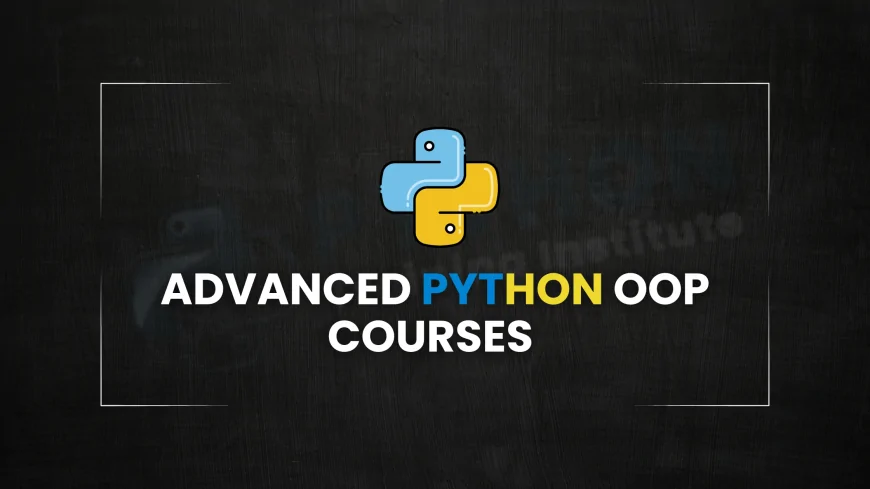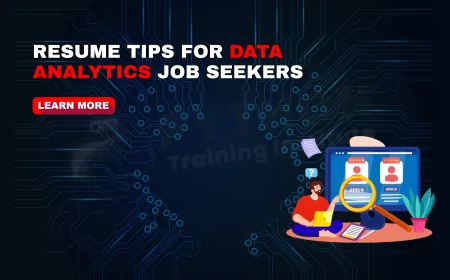Python Object-Oriented Programming Courses Pune | Advanced Python OOP Training Programs in Pune
Explore the best Python Object-Oriented Programming (OOP) courses in Pune. Learn classes, inheritance, polymorphism, and real-world OOP projects with certification and placement assistance. Ideal for beginners and professionals.

Table of Contents
- Overview of Python OOP Courses
- Why Learn Object-Oriented Programming in Python?
- Course Curriculum in Pune Institutes
- Top Institutes for Python OOP in Pune
- Real-Time Projects with OOP
- Placement Support and Internships
- Online vs Offline Python OOP Courses
- Fees and Duration
- Certification and Career Opportunities
- Popular OOP Frameworks Used in Python
- Academic Tie-ups and Collaborations
- Using OOP in AI and Data Science Projects
- Tools & IDEs Taught in OOP Courses
- Emerging Trends in Python OOP Development
- Alumni Success Stories
- Pune’s Python Community and Events
- Who Can Join These Courses?
- Government-Recognized & ISO-Certified Programs
- FAQs
- Conclusion
Overview of Python OOP Courses
Python Object-Oriented Programming (OOP) courses in Pune provide foundational to advanced training on concepts like classes, inheritance, polymorphism, encapsulation, and abstraction. Whether you prefer online convenience or traditional classroom setups, top training hubs and colleges across Pune deliver these structured Python programs.
Why Learn Object-Oriented Programming in Python?
- Most real-world Python projects (Django, Flask, ML libraries) use OOP.
- Helps in writing scalable, modular, and maintainable code.
- Essential for roles in backend development, AI, and enterprise software.
- OOP is often part of technical interviews and coding tests.
Course Curriculum in Pune Institutes
Most courses cover the following:
- Basics of Python syntax and logic
- Defining and using classes and objects
- Encapsulation and abstraction
- Inheritance and method overriding
- Polymorphism and multiple inheritance
- Magic methods and operator overloading
- Design patterns (Singleton, Factory, etc.)
- Unit testing and debugging OOP code
Top Institutes for Python OOP in Pune
- Webasha Technologies – Chandan Nagar
- Recognized for hands-on Python OOP training with real-time projects, practical code labs, and personalized mentor support.
Real-Time Projects with OOP
OOP students typically build:
- Inventory Management System
- Hospital Management Portal
- Banking Application Simulator
- E-commerce product catalog system
Placement Support and Internships
Most reputed institutes offer placement training including resume building, mock interviews, and job portals. Some provide internship certificates after live project completion.
Online vs Offline Python OOP Courses
- Online: Best for working professionals. Includes Zoom/Google Meet sessions, recorded classes, and LMS access.
- Offline: Ideal for beginners. Offers in-person doubt solving, lab access, and weekend/weekdays batches.
Fees and Duration
- Fees: ₹8,000 to ₹25,000 depending on depth and institute
- Duration: 4 to 10 weeks (regular) or 6 weekends (weekend batch)
Certification and Career Opportunities
Most institutes offer ISO-certified or course-completion certificates. After this course, students can apply for:
- Python Backend Developer
- Software Engineer
- Data Analyst (with OOP exposure)
- Automation Engineer
Popular OOP Frameworks Used in Python
- Django – Class-based views, ORM
- Flask – Modular blueprints with classes
- PyQt – GUI design using OOP
- TensorFlow & PyTorch – Class-based ML models
Academic Tie-ups and Collaborations
Colleges like MIT-WPU, Symbiosis, and Vishwakarma Institute of Technology partner with industry players to integrate OOP training via bootcamps, seminars, and MOOCs.
Using OOP in AI and Data Science Projects
- Reusable class-based models for regression/classification
- Encapsulated data preprocessing pipelines
- Model evaluation components as objects
Tools & IDEs Taught in OOP Courses
- PyCharm / VSCode
- Jupyter Notebook (for demonstrations)
- Git & GitHub for version control
- Black or Flake8 for code linting
Emerging Trends in Python OOP Development
- OOP in cloud-native applications
- Test-driven development with OOP modules
- OOP with microservices in FastAPI
- Integration of OOP with DevOps CI/CD pipelines
Alumni Success Stories
- Neha Jadhav: Became a full-time Python developer at Infosys after completing OOP training.
- Rajeev Kumar: Shifted from mechanical engineering to a Python developer role using OOP concepts.
Pune’s Python Community and Events
- PyPune Meetup: Monthly meetups discussing real-world OOP problems
- Hackathons: Conducted by Persistent and TCS for student innovators
- Open-source Pune: Contribute to GitHub OOP projects
Who Can Join These Courses?
- Graduates and undergraduates (engineering, BCA, BSc)
- Working professionals shifting to software roles
- Testers moving to automation or full-stack roles
Government-Recognized & ISO-Certified Programs
Some institutes offer NSDC-approved or ISO 9001:2015 certified Python courses. These come with verified certification useful for employment or freelancing profiles.
FAQs
1. What is OOP in Python?
OOP (Object-Oriented Programming) in Python is a method of structuring code using objects and classes to promote reusability and modularity.
2. Is Python OOP course good for beginners?
Yes, many Pune institutes teach Python OOP from scratch, making it beginner-friendly.
3. How much does an OOP Python course cost in Pune?
The average cost ranges between ₹8,000 to ₹25,000 depending on the institute and course level.
4. Do I need to know basic Python before joining?
Most courses include basic Python in the first few classes. However, prior familiarity helps.
5. What is the duration of the Python OOP course?
Courses typically last 1–2 months, depending on the batch type (weekend/weekday).
6. Will I get a certificate after course completion?
Yes, most institutes offer ISO-certified or course-completion certificates.
7. Can I learn Python OOP online?
Yes, several institutes in Pune offer live or recorded online courses with mentorship.
8. Are projects part of the OOP course?
Yes, real-world projects such as inventory systems, CMS, or dashboards are included.
9. What are the career options after this course?
You can become a Python developer, backend engineer, or use it in AI/ML projects.
10. Which IDE is used in these courses?
Mostly PyCharm, VSCode, and Jupyter Notebook are used for development.
11. Are there job guarantees?
Some institutes provide placement assistance, but job guarantees vary by provider.
12. Is Python OOP used in AI?
Yes, many AI tools like TensorFlow and PyTorch are built using OOP principles.
13. Do companies prefer OOP knowledge?
Yes, especially for backend and full-stack development roles.
14. Are evening or weekend batches available?
Yes, many institutes provide flexible scheduling for working professionals.
15. Can I build a portfolio with this course?
Yes, you’ll work on real projects that can be showcased on GitHub or LinkedIn.
16. What if I miss a class?
Online students get recordings; offline institutes may allow makeup sessions.
17. Are EMI options available?
Yes, many institutes offer no-cost EMI or partial payment schemes.
18. Can school students join?
Yes, higher secondary students with coding interest can join beginner-friendly batches.
19. Is this useful for automation testing?
Yes, OOP knowledge helps in writing reusable test scripts and frameworks.
20. What kind of support is provided post-course?
Institutes offer doubt-solving forums, alumni networks, and resume guidance.
Conclusion
Python Object-Oriented Programming courses in Pune are a vital stepping stone for aspiring developers, AI enthusiasts, and backend engineers. With extensive training options, flexible batches, and career support, Pune remains one of the best places to start or upgrade your Python programming journey using OOP principles. Choose a course that fits your learning style—online, offline, or hybrid—and start mastering object-oriented design today.
What's Your Reaction?
 Like
0
Like
0
 Dislike
0
Dislike
0
 Love
0
Love
0
 Funny
0
Funny
0
 Angry
0
Angry
0
 Sad
0
Sad
0
 Wow
0
Wow
0














